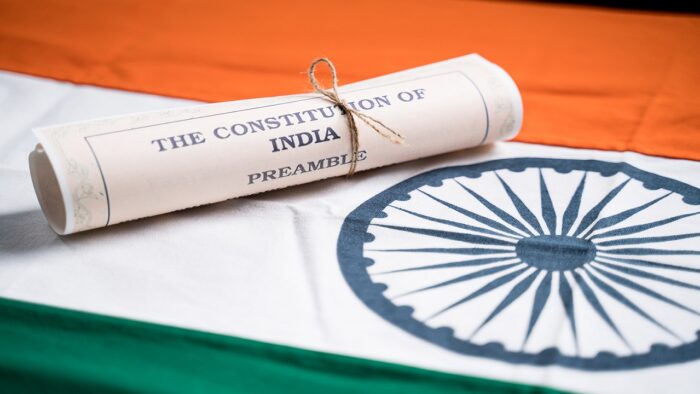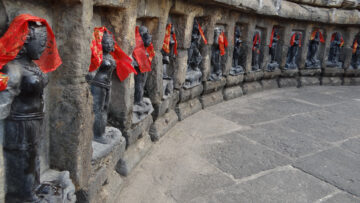Abstract
It is a widely held belief that the Directive Principles of State Policy enshrined in Part IV (Articles 36 to 51) of the Indian Constitution were inspired by the constitution of the Irish Free State and the UN Universal Declaration of Human Rights. However, on closer study, we find that the ideals promulgated by the Directive Principles of the Indian Constitution were already embedded in ancient Sanskrit texts on governance such as Arthashastra, ShukraNiti, and the Mahabharata.
This paper will attempt to trace, select and study relevant shlokas from three Sanskrit treatises on Dharmashastra and Rajneeti (the Arthashastra of Kautilya, ShukraNiti and the Mahabharata (Shanti Parva) that reflect the same ideology as that of the Directive Principles of State Policy as enunciated in the Indian Constitution. Thus, this paper will be an attempt to synthesise and compare the modern political thought of welfare state as envisaged in the Directive Policies and the concepts of Prajahitam and Rashtrahitam inherent in ancient philosophy of Rajdharma.
Introduction of Directive Principles of State Policy
The Directive Principles of State Policy (DPSP), enshrined in Part IV of the Indian Constitution and spanning across Articles 36 to 51 are among its key highlights.
The DPSP embody the objectives and ideals which the Union and State Government must bear in mind while formulating policies and making laws. They cover subjects like labour welfare, women and children, prevention of cow slaughter, agriculture, environment and even international relations.
While these principles are said to be non-justiciable, i.e. not enforceable in courts of law, they impose a duty on the State to follow these principles while enacting any laws.[1]
Historical background
It is popularly believed that the framers of the Constitution were inspired by the Irish Free State which has a similar provision in its constitution. Dr. Ambedkar referred to them as a “novel feature” and “similar to the Instrument of Instructions”. In his words, the Directive Principles “are like the instrument of instructions, which were issued to the Governor-General and to the Governors of the colonies of India by the British Government under the Government of India Act of 1935. What is called Directive Principles is merely another name for the Instrument of Instructions.”
After attaining Independence, the challenge before India was to frame a constitution which could satisfy the aspirations of all people of India and lay down the foundation for an equitable and welfare state.[2]These are incorporated to attain the ultimate ideals of the Preamble i.e. justice, liberty, equality and fraternity. Moreover, they also incorporate the idea of a welfare state.[3]
Though seemingly borrowed from the Irish Constitution, the roots of the Directive Principles of State Policy lie in the history of India itself.[4]
Tracing roots of DPSP in Indic texts:
Keeping the Irish Constitution and the Govt of India Act, 1935 aside, can the ideals espoused by the DPSP be traced farther back into history, to ancient Indian texts which provided guidance to the conduct of Governments and moulded the way of life of people in Bharathavarsha?
Our Itihaasas and Shastras are replete with direct and indirect advice to Kings on the conduct of the affairs of the state. We can see many parallels to the idea of DPSP in these texts and an alignment of the overall vision of creating a just and equitable society.
In this paper, an attempt has been made to trace the origins of some of the DPSP to ancient Indian texts – specifically to verses in Arthashastra, ShukraNeeti and Rajya Dharma Anushasana parva of the Mahabharata.
Article 38
Article 38 states “Promote the welfare of the people by securing a social order through justice—social, economic and political—and to minimize inequalities in income, status, facilities and opportunities”
Creation of a welfare state and ensuring the welfare of the citizens is the cornerstone of the DPSP. We find that this concept of ‘welfare’ is highlighted in our ancient texts. Here are some instances:
Chankaya in the ArthaShastra says,
प्रजासुखेसुखंराज्ञःप्रजानांचहितेहितम्।
नात्मप्रियंप्रियंराज्ञःप्रजानांतुप्रियंप्रियम्॥ (अर्थशास्त्र 1/19)
(Meaning: In the happiness of the subjects lies the happiness of the king; the welfare of the subjects is the welfare of the king.)
A similar thought is also expressed in the ShukraNiti
नृपस्यपरमोधर्मःप्रजानाम्परिपालनम्
(Meaning: The welfare of his subjects is the prime dharma of a king.)
In Shanti parva of Mahabharata, Bhishma advises Yudhishthira,
यदह्नाकुरुतेधर्मंप्रजाधर्मेणपालयन्
दशवर्षसहस्राणितस्यभुन्क्तेफलम्दिवि.(Shanti Parva 71.29)
(Meaning: The king who takes care of his subjects, earns punya equivalent to ten thousand years in swarga.)
He goes on to gives an interesting example,
मालाकारोपमोराजन्भवनाङ्गारिकोपम: (Shanti Parva 71.20)
(Meaning: Be like a gardener, not a charcoal burner implying that a king should be like a gardener who nourishes the roots of his plants to ensure their growth, and enjoys their fruits later on.)
Article 39
The article 39(f) reads “The State shall, in particular, direct its policy towards securing – that children are given opportunities and facilities to develop in a healthy manner and in conditions of freedom and dignity and that childhood and youth are protected against exploitation and against moral and material abandonment. The scope of this article was amended by the 42nd Constitutional Amendment Act. While referring to this article, the Supreme Court has observed, “In a civilised society the importance of child welfare cannot be overemphasised, because the welfare of the entire community, its growth and development depend on the health and well-being of its children.[5]
Since children constitute the most vulnerable section of society, they are susceptible to physical and economic exploitation. Hence, they require special legal and social protection which is provided by Article 39(f).
In the Arthashastra too, we find a similar provision to protect children and minors, especially orphans.
बालवृद्धव्याधितव्यसन्यनाथांश्चराजाबिभृयात्
स्त्रियमप्रजातामंप्रजायाश्चपुत्रान् | (2.1.26)
बालद्रव्यम्ग्रामवृद्धावर्धयेयुराव्यवहारप्रापणात् | (2.1.27)
(Meaning: The king shall provide the orphans, destitute children (bala) and the helpless with maintenance. Where children are born to helpless mothers, they too shall be protected by the king.” The village elders were expected to safeguard and improve the property of the bereaved minors till they attained maturity.)
Article 43
This article aims to ensure that workers are not exploited economically and not forced to work in unsuitable conditions. Article 43 states “The State shall endeavour to secure, by suitable legislation or economic organisation or in any other way, to all workers, agricultural, industrial or otherwise, work, a living wage, conditions of work ensuring a decent standard of life”.
An exact echo of Article 43 can be found in ArthaShastra
दुर्गजनपशक्त्याभृत्यकर्मसमुदयपादेनस्थापयेत्कार्यसाधन
सहेनवाभृत्यलाभेनशरीरमवेक्षेतनाधर्मार्थौपीडयेत् (5-3-19)
(Meaning: In accordance with the place of residence (city or countryside), the wages of the worker shall be fixed. The employer shall pay due regard to the body and the income of workers earned as wages, so that no harm is caused to either the material advantage or the spiritual well being of the workers.)
The ShukraNiti goes a step further and suggests a performance-based incentive
“यथायथागुणवान्भूतकस्तदभृतिस्तथा| संयोज्यातुप्रयत्नेननृपेणातमहितायवै || (2.401)
(Meaning: As the productivity and skill of the worker increases, his wages should also be increased.)
The Manu Smriti even has provision for sick leave,
आर्तस्तुकुर्यात्स्वस्थःसन्यथाभाषितमादितः | सदीर्घस्यापिकालस्यतल्लभतैववेतनम् || (8.216)
(Meaning: If a normally industrious worker falls sick, he should be given a leave with wages for a long period.)
Article 48
Article 48 provides that the State should take steps for prohibiting the slaughter of cows and calves and other milch and draught cattle. The demand for prohibition on cow slaughter has religious and civilizational connotations. The scriptures are replete with proclamations about the sanctity of the cow and explicitly prohibit its killing.
As per Manu Smriti,
नहिम्स्याद्ब्राह्मणान्गाश्च्सर्वाण्श्चचैवतपस्विनः (4.162)
(Meaning: Brahmanas, yogis and cows should not be harmed)
The Mahabharat says,
घातकःखादकोवापितथायश्चानुमन्यते
यावन्तितस्यारोमाणितावद्वर्षाणिमज्ज्ति॥ (Anushasana Parva, 74.4)
(Meaning: He who kills a cow, eats the flesh of a cow or allows its slaughter, will languish in hell for as many years as there are hairs on his body.)
The Arthashastra prescribes death penalty to whoever kills, hurts or steals a cow.
स्वयम्हन्ताघातयियाहर्ताहारयिताचवध्यः
(Meaning: He who kills a cow or causes it to be killed, steals a cow or causes it to be stolen should be put to death.)
Conclusion
It is thus evident that the concept of social welfare (which forms the basis of Directive Principles) has already been voiced, propounded and propagated by political thinkers of Ancient India. Similar parallels can be traced for many of the socio-economic and legal provisions, framed for the modern society. This paper is just a pointer on the existence of connections to our roots. It is the need of the hour for the legal fraternity to appreciate and understand the Indic roots of the liberal concepts and a more comprehensive exercise may be taken up.
Bibliography
- Austin, Granville. The Indian Constitution-Cornerstone of a Nation: OUP India 1999.
- Rangarajan, L.N The Arthashastra: Penguin Books 1987
- Shayamasastry,R Kautilya’sArthashastra (English Translation): Bangalore, Government Press 1915
- Mahabharatam Gorakhpur, Gita Press
- SukraNiti: Sukracarya : Internet Archive
[1]Decoding Directive Principles of State Policy (DPSP) – Lawstreet Journal
[2]Panwar, Nalin Singh. “DIRECTIVE PRINCIPLES OF STATE POLICY ENVISIONED IN INDIAN CONSTITUTION : A Critical Review of Its Implementation in Madhya Pradesh.” The Indian Journal of Political Science, vol. 71, no. 1, 2010, pp. 323–32. JSTOR, http://www.jstor.org/stable/42748390. Accessed 21 May 2022.)
[3]Dr.Amaresh Chandra Sahoo, “Directive Principles of State Policy & Social Justice: An Evaluation”, International Journal of Science and Research (IJSR), Volume 9 Issue 6, June 2020, pg 1130 – 1132
[4]Granville Austin, The Indian Constitution: Cornerstone of a Nation, 76 (4th ed.), 2001
[5](Lakshmi Kant Pandey V Union of India, AIR 1984 SC 496)
Feature Image Credits: istockphoto.com
Conference on Ethics Law & Justice
Watch video presentation of the above paper here:
Disclaimer: The opinions expressed in this article belong to the author. Indic Today is neither responsible nor liable for the accuracy, completeness, suitability, or validity of any information in the article.








